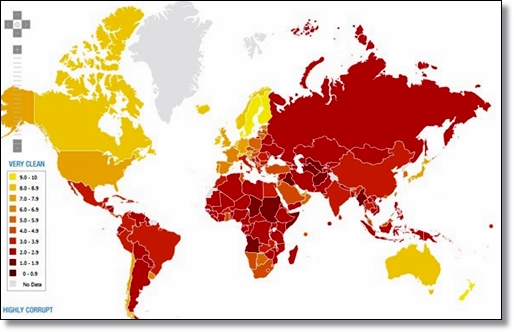Corruption: Virtue or Vice?

 |
| TI Corruption perception index 2010 |
To stop corruption, Africa should draw from global examples to understand why, how and when corruption should be seen as negative or relatively acceptable. This article focuses on the East Asian region to explain the parallelism between corruption and economic development focusing on the conventionalist and revisionist arguments.
Corruption and its effects has been explained by J.S.Nye in his article Corruption and Development: A Cost-Benefit Analysis. (J.S.Nye 1967.) While moralists argue that corruption impacts negatively on political and economic development, revisionists hold that corruption is a panacea to economic development, national integration and the improvement of governmental capacity.
How can corruption bring about positive results in the developing world? Below is a discussion on the effects of corruption based on various scholarly views from East Asia.
Revisionists believe that economically corruption has developmental advantages. This can be in form of capital formation, entrepreneurship and flexibility in economic bureaucracies. This is true in East Asia. In China for example, corruption reportedly increased during the reform period with less negative effect on its economic growth. While comparing how corruption was less destructive in China than Russia, Yan Sun noted in Reform, State and Corruption (Yan Sun 1999) that Officials were bribed by non state actors to induce favorable policies to carry out their economic activities. The amount of profit sharing from private hand had less harmful effect but resulted into good social results such as reinvesting the money into the economy.
Unlike in other developing regions like Africa were resources obtained through corruption are usually taken out of the country by government officials into “Swiss accounts,” in China, this money is reinvested in the country to generate more economic activities. Therefore, the question of where do the resources obtained through corruption go (accountability)?
Another merit of corruption can be determined by the power distribution between patron-client networks in which corruption transactions are conducted. MushtaQ Khan in The Efficiency Implication of Corruption (MustahQ H Khan 1996) notes that the power distribution between patron-client networks in which corruption transactions are conducted should be considered for positive corruption result. In the case of South Korea in East Asia, bribery in industries such as Hyundai, Samsung, Daewoo and Lucky Gold star, has been used to avoid or lessen of taxes hence resulting into competitiveness, efficiency and boosting of the economy.
Politically, revisionists believe that corruption can lead to national integration. This a result of close ties or relations created between elites and government officials (patron-client relationship). While Neoliberals like John Gerring and Strom Thacker assert that neoliberal policies can help deter corruption by less state intervention in the economy (John Gerring and Strom C. Thacker,2005), this has not been the case in democratic countries of East Asia like Japan. In his paper Corruption and Trust (Eric Chang and Yun-han Chu 2006), due to political cultural and electoral politics, the negative impacts of corruption have been neutralized in East Asia. In Japan for example, the pork barrel activists have played a great role in the smooth integration of peasants and politicians in search for votes. Political corruption has thus served as grease for the bureaucrats machine and elites. Political corruption during the democratization process in East Asian countries like South Korea, Philippines and Japan has promoted political participation as well as a stable and binding political environment.
Finally the revisionists assert that corruption plays an important role as a means of increasing governmental capacity. This would be in form of finances, helping governments to promote parties and democracy and it can use this money to boost the economy. Xiaobo Lu in Booty Socialism, Bureau-preneurs, and the State in Transition: Organizational Corruption in China (Xiaobo Lu.2000) explains that through organizational corruption, governments use state agencies to achieve monetary or material gains through monopoly. For example in China, the state acts as either an independent promoter of the local economy or a collaborator with local enterprises or an entrepreneur itself directly involved in profit making.
Despite the above advantages of corruption by revisionists, they to agree that corruption would still have negative effects on the development of the state. Economically it would threaten foreign investment, lead to wastage of resources such as capital flight and breed political instability by violating the fundamental principles of good governance such as accountability, equality and openness as witnessed in most developing nations.
In summary, as briefly explained above in relation to developing states of East Asia, Corruption can spur positive results in terms of economic and political development. However the above is not in isolation of other factors like the role of state institutions and culture. Therefore in conditions where state institutions are weak with a culture against corruption, the reverse is true. Corruption will only produce negative effects in society.
By Ntono Diana
Graduate Student, Institute of international Studies, Jilin University, PR China.
